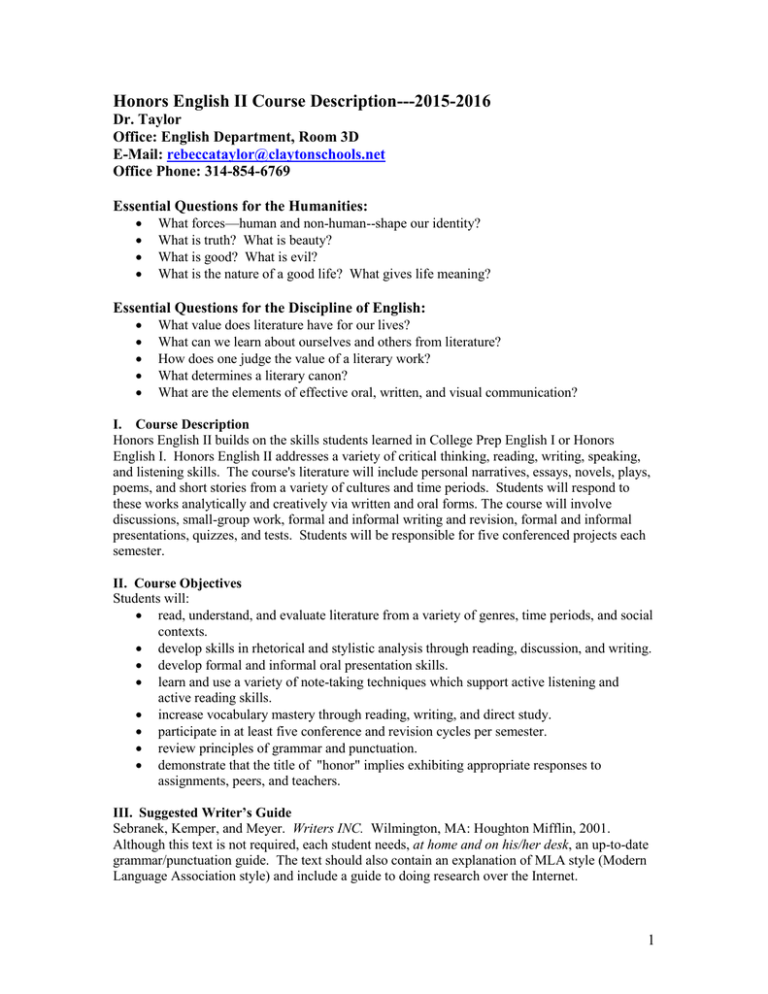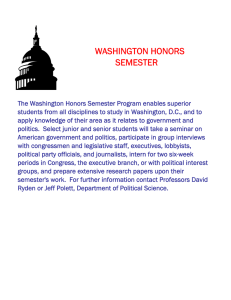Honors English II Course Description---2015-2016
advertisement

Honors English II Course Description---2015-2016 Dr. Taylor Office: English Department, Room 3D E-Mail: rebeccataylor@claytonschools.net Office Phone: 314-854-6769 Essential Questions for the Humanities: What forces—human and non-human--shape our identity? What is truth? What is beauty? What is good? What is evil? What is the nature of a good life? What gives life meaning? Essential Questions for the Discipline of English: What value does literature have for our lives? What can we learn about ourselves and others from literature? How does one judge the value of a literary work? What determines a literary canon? What are the elements of effective oral, written, and visual communication? I. Course Description Honors English II builds on the skills students learned in College Prep English I or Honors English I. Honors English II addresses a variety of critical thinking, reading, writing, speaking, and listening skills. The course's literature will include personal narratives, essays, novels, plays, poems, and short stories from a variety of cultures and time periods. Students will respond to these works analytically and creatively via written and oral forms. The course will involve discussions, small-group work, formal and informal writing and revision, formal and informal presentations, quizzes, and tests. Students will be responsible for five conferenced projects each semester. II. Course Objectives Students will: read, understand, and evaluate literature from a variety of genres, time periods, and social contexts. develop skills in rhetorical and stylistic analysis through reading, discussion, and writing. develop formal and informal oral presentation skills. learn and use a variety of note-taking techniques which support active listening and active reading skills. increase vocabulary mastery through reading, writing, and direct study. participate in at least five conference and revision cycles per semester. review principles of grammar and punctuation. demonstrate that the title of "honor" implies exhibiting appropriate responses to assignments, peers, and teachers. III. Suggested Writer’s Guide Sebranek, Kemper, and Meyer. Writers INC. Wilmington, MA: Houghton Mifflin, 2001. Although this text is not required, each student needs, at home and on his/her desk, an up-to-date grammar/punctuation guide. The text should also contain an explanation of MLA style (Modern Language Association style) and include a guide to doing research over the Internet. 1 IV. Selected Texts Haroun and the Sea of Stories, 1984, Aristotle's Poetics, Candide, Macbeth, The Bible as/in Literature, Beka Lamb, Black Boy, Catcher in the Rye, Persepolis, The Things They Carried, a selected group of essays and short stories, and a broad range of poetry. V. Threads of Connection Several strong links connect the texts of Honors English II. Autobiography and biography, especially the coming of age narrative, provide the principal link. The other important threads are the study of drama, poetry, and the Bible as/in literature. VI. Thematic Questions What is an individual? What is a family? What is a community? What is an individual’s responsibility to him/herself? What is an individual's responsibility to his/her family? What is an individual's responsibility to his/her community? Specifically: Who am I and how can I craft relationships with others? Where does power lie in a democratic society? What responsibility does an individual in a democracy have vis-à-vis society’s power structures? What responsibility does an individual have to discover and deploy his/her own power, talent, energies, etc.? How does literature affect who we are as individuals? What does literature teach us about our past, present, and future? How does literature express the desire to “get back to the garden” and/or the desire to “cultivate our gardens”? What forces influence and shape us? In what ways do individuals respond to these forces? How can an individual maintain identity when outside forces challenge his/her beliefs? To what degree is an individual responsible for creating meaning? Are humans “condemned to freedom”? VII. Methods of Evaluation Students will be evaluated on compositions, daily classroom work, quizzes, tests, journals, presentations, and participation. Grades will be based on total points; the final exam will count for 10% of the grade. A student whose fall semester grade falls below a B- will meet in conference with his/her parent and the teacher to discuss the best placement for the student during second semester. A+ A A- 98% and above 93-97 90-92 C+ C C- 78-79 73-77 70-72 B+ B B- 88-89 83-87 80-82 D+ D DF 68-69 63-67 60-62 <60 VIII. Organization Keep an organized, loose-leaf binder to be used solely for this class Follow the order of the list of handouts written on the poster board in the classroom. Number and date each handout in the upper RIGHT hand corner. For each completed unit, keep a folder at home for the unit’s handouts. For example, after we finish Haroun and the Sea of Stories and have our exam, transfer your assignment sheets, etc., to your home folder. In this way, you will have an archive of handouts to study for the final exam. 2 Bring an ample number of blue or black pens + sharpened pencils IX. Expectations Students will demonstrate respect and responsibility for themselves, their teacher, their peers, and their environment by: attending class daily and arriving on time. Please be courteous: arrive on time so that your late arrival does not interrupt the class. (See the CHS tardy policy outlined in the Student Planner.) being seated and having class materials ready to use at the bell. entering the classroom with all electronic devices turned off and out of sight. bringing all materials to class daily. asking questions when assignments, content, or discussions are unclear. listening actively when others are talking. leaving the room clean and orderly. arriving at conferences on time. making up promptly work and conferences missed because of excused absences. keeping an organized notebook with syllabi, worksheets, etc. understanding that conferences (worth 20 points each) are a tremendously important element of the CHS English program; missed conferences will result in a 50% penalty. Students who have an unexcused absence from a conference will be assigned an after-school detention in the Detention Room. understanding that work must come in the day it is due and be turned in at the beginning of class. Unless the student uses a coupon (see below) or serves a Wednesday make-up session (see below), late work will not be accepted. Assignments missed because of an excused absence must be turned in within the same number of days as the days missed; for example, if the student misses Tuesday, he or she has one day to complete the make-up work, which will then be due on Thursday. The consequence of an unexcused absence is that the work missed cannot be made up and no credit will be given. understanding that students will receive, each semester, one coupon which will afford one 24hour extension on a writing project. These coupons should be reserved for crunch times, e.g., when a computer crashes or a printer will not work. Coupons must be turned in at the time the work is due, and the late work must come in during the next class period. (If the work is due on a Friday, use of the coupon will make the student’s essay due in class on Monday.) Coupons may NOT be used for conferences, on days scheduled for peer reviews of essays, or for other schedule-sensitive work such as tests and quizzes. understanding that in order to receive credit for late work without a coupon, the student must attend an after-school make-up session on the NEXT designated Wednesday. Each make-up 3 session will last from 3:05 to 4:00. (Students arriving after 3:10 will lose that week's makeup privilege.) After attending the study session, students can earn up to 85% of the credit lost. In order to regain their credit, students must exhibit proper behavior during the study session. understanding that it is the student’s responsibility to turn in hard copies of his/her homework, essays, etc. In other words, please take heed that I do not accept emailed assignments. X. Conferences You will have the amazing educational opportunity to attend five 20-minute conferences each semester. In these conferences, we will discuss ways to improve your writing. Attend your conference on the right day at the right time. Use your planner! (Remember—a missed conference will cost you 10 points and/or an after-school detention.) Please knock on the door at the time of your appointment so I know that you are there. (Don’t worry that you are interrupting—it’s your conference time!) All papers (both preliminary drafts and revisions) must be typed, double-spaced, and produced in MLA format. Please use 12-point, Times or Times New Roman. Print out two copies of each draft. Hand in one to me on the due date and keep a copy for yourself. To prepare for your conference, re-read your paper, mark it, respond to comments from your peer review, and bring the paper with you. Write questions in the margins, circle words/phrases you might want to revise, underline shaky sentences, question your assumptions, etc. Interact with your paper! Be ready to communicate what you want to do to make your paper even better. XI. "No Excuses" The Clayton High School English Department has chosen 12 grammar and punctuation rules that all students need to be aware of. Please see the Clayton High School Writers’ Contract (on bright purple paper) and please begin, right away, to proofread for these basic rules. I am looking forward to an absolutely fabulous year of exciting intellectual work with CHS’s top literary scholars! Welcome to Honors English II! Proud Class of 2018!!! Go, Hounds!!! 4

